- Home
- Lionel Shriver
Ordinary Decent Criminals Page 4
Ordinary Decent Criminals Read online
Page 4
“As long as he can win.”
“Exactly. Besides, there’s a beguiling frailty to Roisin. One of those women who can spend all day in bed. I don’t know if she gets migraines, but she should. She makes you want to take care of her.”
“So far you’ve described a well-dressed rabbit.”
“That’s not fair,” Constance insisted, with discipline. “Roisin can be fractious, but when you smooth her back down she is sweet. And to see her thrive on the merest tidbit, that you like her blouse or her sofa—her childhood must have been appalling.”
“Aye,” Farrell murmured. “What’s sad is, she’s still looking for what the rest of us gave up on long ago.”
“Farrell O’Phelan, if you think you’ve given up on it, you’re fooling yourself.”
He put his arm around her shoulder, but absently. She liked it when he absorbed himself elsewhere so she could discreetly study his face. It never bored her. The eyes so deep-set, the nose so lumpy and Roman, those drastic bumps and hollows sculpture for the blind. She could see leading a pair of pale, unsighted hands to his head: Now, this is a face. This is a real face.
Because Farrell himself never bored her. And she knew everything—his distaste for red cabbage, his shirt size. Name a season and a year for the last forty-three and she could tell you precisely what he was doing and even when he got up in the morning—though a few years there were easy: at noon to drink till 5 a.m., like reporting for work. Yet there remained something insoluble about him; he was like Flann O’Brien’s infinite bureaus within bureaus, so that every time when you thought you had drawn his very self out of his own drawer there was one more inscrutable bit inside; she would have to pick out the next speck with tweezers, and would shortly be found scuffling the floor, having dropped him, the part she didn’t understand and therefore the only part that mattered, the clue.
Farrell stirred. “You’re cold,” said Constance. “Let’s head back. There’s a powerful lot of phone calls to return. And two boys from Turf Lodge rang up, with word they’re to be knee-capped. They want to spend the night in your office.”
“Check their story; only the outer room; no beer.”
“Then it’s time for Oscar’s, isn’t it? I know the food is desperate, but when you ignore them they’re hurt. They miss you.”
“What they miss is our sixty-quid checks. No, I’ve something on this evening.”
“Oh.” She did not know everything.
“I’ll ring you when I get home,” he offered.
“That would be lovely.”
“… We had dinner together last night,” said Farrell.
“Yes.”
“… and the night before.”
“Yes.”
“And lunch! And probably will dine tomorrow night as well!”
“Of course, if you like,” she said graciously. “If you’ve nothing else planned.”
“What do you bloody want, then?”
“I didn’t say anything.”
“You didn’t have to!”
Farrell scowled into the collar of his overcoat. They did not hold hands.
chapter three
The Green Door, or Everybody Likes Lancaster
The Green Door had no such thing. Caged across the front, the club was coiled with razor wire; even the little neon sign, burned out, was fenced in. The entrance wasn’t green but brown, its peephole rheumy.
“O’Phelan,” the guard at the door grunted. “Trouble himself.”
“I’ve gotten as many pillocks out of trouble as in. A good record, for this town.”
“Right you are, our own Captain Marvel. Though I hear tell, you don’t muck in as you used. Keep the nails clean and that.”
“Excuse me, but at eight o’clock,” Farrell towered, “I have a date in there with a curvaceous little glass of wine.”
“For you, O’Phelan, the glass is sure only as wee as a mate could do laps in.”
“I don’t swim.” Farrell made a move for the door.
“We’ve yet to explore,” the guard said grandly, barring the way, “what makes you feel so comfortable in these parts.”
“In the last ten years,” said Farrell calmly, “I’ve been credited as a Provo, a Stickie, an Irp, and a legman for branches of the IPLO you haven’t even heard of; as a propagandist for the UDA, eccentric fop for the SDLP, CIA agent, Special Branch hit man, British supergrass, and IDA occupational safety inspector. I imagine with those credentials I can waltz into any pub in town.”
“Och, you think it’s all a game, man.”
“Yes.”
After three separate grillings to get in, each more suspicious than the last, Farrell was bewildered why he bothered. He hated catering to their self-importance.
Inside Farrell shook his head—a whole city full of warm, intimate bars, the Crown, the Morning Star, the Rotterdam, and West Belfast crammed into these grotty drinking clubs. By what poor guidance or misfortune did the American drink here? For the Green Door was the worst: bare bulbs overhead, long, laminated tables, crumbling ceiling tiles. A wooden Armalite mounted like a marlin over the bar; a collection of plastic bullets on the counter, long, round, heavy boles fondled gray, like merchandise from a secondhand sex shop. The usual Gerry Adams posters and H-block brouhaha covered the walls: REMEMBER BLOODY SUNDAY!; DON’T FRATERNIZE! THIS BRIT COULD BE STANDING BESIDE YOU—WATCH WHAT YOU SAY; SOLDIERS ARE WE, WHOSE LIVES ARE PLEDGED FOR IRELAND; BRIT THUGS OUT; SS RUC … but Farrell had read these so many times before that they faded into so much wallpaper. The best thing about propaganda is its short shelf life—successfully familiar, it disappears.
“Hulloo, Farrell!” Though they hadn’t seen each other for five years, Duff hailed him as if that were just the other day—and in Duff’s way of thinking, Farrell supposed, it was. Time was like everything else in Duff’s life that he swallowed in quantity—Guinness, sausage rolls, other people’s stories. “How are you keeping?” As he pressed Farrell’s hand, Shearhoon’s eyes squeezed tight. Strange, for such an expansive character he had a nervousness, a flinch. Then, Farrell had spent enough time around rapacious politicians to enjoy the more leisurely ambitions of Shearhoon tonight. He was one of those affable men out to take over the world simply by consuming it. Duff’s steady advance on occupying space would make a pleasant low-budget horror film.
“Wasn’t I talking you up the other day, just. Remembering back in ’72 on the barricades, do you know? Brits lined up just outside the no-go all confused like, mothers and wains about, houses afire. Every wee soldier sure he’s tomorrow’s headline in the Irish News for shooting a toddler. It’s the lads! your women all cry. Make way for the lads! And if Farrell O’Phelan doesn’t climb on top of the burning bus like Moses, do you follow? Hair out to here and eyes out farther. Farrell, you missed your calling as a priest, so you did. You’d put the fear of hell in a bottle of Baby Cham.”
“So were you one of the lads?”
Farrell turned and didn’t recognize her at first: she was on the wrong side of the bar. Sweet Jesus, she worked here. Farrell felt immediately he’d made a mistake, and wondered why he’d come. Idle curiosity, he supposed, since this was the only plan for the evening whose sequence he couldn’t quite foretell, while Shearhoon’s tale here, for example, was strictly pub liturgy. He had liked that he couldn’t write her lines. But now he could fill them in easily enough—she was another one of those NORAID bims from Boston with Irish ancestors. How exciting, working in a Republican club with the hard men—
Farrell rubbed his face. “No, my dear, I was not one of the lads. Disappointed?”
“Hardly.”
Right answer; he would treat her at least to the story. “That was the day the British interned thirteen activists from the leadership of the PD. Dragged out of bed without time to wash their teeth. Searches all morning. The Falls was roiling. Whole families on the streets.”
“Sounds like quite a party,” said Estrin.
Of course it would to you, Farre
ll swiped, but had to admit, “It was. Though for me in ’72 every day was a party.”
“Meaning your youth, or the festivities?”
“Talisker!” cried Duff.
“Closer,” Farrell explained, “to a premature old age.”
Estrin shook her head. “A malt’s a waste on a bender.”
“Low as I ever sank, I never drank less. A matter of principle.”
“Style,” she corrected. “There’s a difference. So what possessed you to climb on top of that bus?”
“To tell the mothers not to go inside.”
“Why?”
“Strategy, my dear. Those soldiers had been trained for snipers, but were stymied by prams. They could plow up the barricade if it were manned by lads, but not if they were two years old. So I said, Bring up the prams! Best front line ever invented.”
“What happened?”
“I fell off the bus.”
“On a pram!” Shearhoon cried.
“You can imagine”—Farrell smiled—“this argued poorly for my strategy.”
Through their laughter Estrin asked, “Was it really funny? At the time?”
“No,” Farrell conceded. “Because if I’d been sober I could have changed what happened.”
“You do think a lot of yourself.”
“It doesn’t matter what I think of myself,” he dismissed impatiently. “The point is, I was right. The Provies moved in, swaggering like Charles Bronson, and everyone bloody well ‘made way for the lads.’ Prams—better than armored tanks!—pulled into the estates, and the Falls went empty save these yokels with Armalites, who braced on the hip and opened fire. You should have seen those soldiers’ faces light up. They were delighted. Now they understood their parts: O.K. Corral. They burrowed down on the pavement and slipped behind buildings and trained their sights: hell, you’d seen this clip before, you could turn it off.”
“And where were you?”
“Curled by the bus, just waking up, luckily on the Falls side, and desperate to take a piss. That, my girl, is the stuff of real history.”
The club became crowded, and Estrin was busy at the taps. More of Farrell’s acquaintances—he would consider them no better; in fact, he thought of himself as having no friends—rabbled to the bar, gripping his shoulder, blattering out tales. Their favorites were from his drinking days, extolling a fame that amounted to a medical achievement. “Aye, and I watched him myself knock back five brandy-and-ports the next morning, and then, steady as you please, strolls into the UDA and asks for a calendar!” Duff Shearhoon was in his element, for as most people will who prefer spinning yarns to living more of them, Duff maintained his old favorites in impeccable detail, like a man who, unable to afford new clothes, keeps his small wardrobe freshly laundered.
Farrell fought back a yawn. It struck him, amid the bawdy back-clapping, red faces leaning to his stool, how he might have longed for such a scene at seventeen—lonely and gangling, turning from the Church but with nothing to replace it, inward and socially inept, not even much of a drinker yet; full of ideas he could only put in exalted and therefore ridiculous form; to others, unpleasantly adult. No—Farrell looked around—this was adulthood: porter spilling on the floor, the laughter half relief there was something, anything, to say tonight. Back then he’d have lapped it up, and why had none of these big rowdy men gathered around him in the days he had bad acne? How reliably, even when you did get what you wanted, it was hopelessly belated—parts on order years ago arriving only once you’d sold the car. Farrell’s whole life was too late; he pictured Jesus rattling his screen door calling, “Mr. O’Phelan! Sir! We’ve your serenity in, so sorry for the delay!” and Farrell doesn’t answer because he’s dead.
Serenity, uch, just as well.
Estrin returned with his wine, though she could barely find room for the glass among the complimentary whiskeys he didn’t want. Less arrogant, he might have prepared a look of embarrassment for when their eyes met, but Farrell being Farrell, he let his boredom show instead.
He followed her through the cracks in his retinue. The dogs-bodies were chatting her up. Most Americans weren’t much at banter, so he enjoyed the easy reflex with which she kicked remarks back, a goalie defending against an inferior team. He wondered which of these willicks she was fucking.
Farrell ducked out of his party; they could tell Farrell O’Phelan stories better without him. The obligations of accuracy only rained on their parade.
“You seem quite popular here,” he said in her ear.
“I know,” she said with a funny despair. “Listen, I’ve got to wash up some of these pints, because we’ve run out again and I’ve told Kieran, just buy some more, but no-o—I swear I could run this bar by myself if they just laid in more glasses, but instead they hire a second bartender every night—typical false economy. Anyway, want to run back with me? Malcolm!” she shrilled over the crowd as only an American could. “Cover the bar!”
They were both relieved at the brief quiet of the back kitchen.
“You know it’s funny, but I’m tired of people liking me? My boyfriend in Berlin, it drove him wild. We’d go to a party and he’d sulk in the back while I’d get on with his friends; they’d all switch to English just for me. Pretty soon he started thinking of excuses why we couldn’t go. Everybody likes Lancaster—he used to say that all the time. More and more caustic. Dieter didn’t like me himself; no, he detested me in the end …”
The rate at which she washed glasses was astounding, though this intimate a proximity to a dishrag made the sweat break out on Farrell’s hands.
“You prefer to be detested?”
“It’s more of an accomplishment. This liking business, it just seems a trick: make a few jokes, preferably at your own expense; be attentive, don’t talk too long; confide only to the extent that you flatter, but never, never ask for sympathy, for anything, act as if you don’t care if they like you, which is the key, but still just a gambit— Oh, there are plenty of methods, and—” She looked up from the sink. “I’m not employing any of them at the moment.”
“No, if I’m to find you despicable, you’ll have to do better than this.”
“But have you any idea the number of people who’ve liked me now, all over the world? My God, I’m getting so when I take the train down to Dublin I try to take up the seats around me with my luggage, not because I don’t want company exactly, but I don’t want to compulsively ingratiate myself one more time. It’s humiliating, it’s obsequious, and then they want to keep in touch and everything. The pockets of my jackets are filled with ticket stubs scribbled with the addresses of strangers; I don’t remember who half of them are. So I don’t find likableness a particularly likable quality anymore. It’s still an expression, if competent, of the desire to please. Me, I admire people who are obstreperous, inconsiderate, abusive, and nonplused. Card-carrying assholes.”
“Spot on,” said Farrell. “I’m your man.”
“Not so far. You’re fucking polite. Why don’t you tell me to shut up?”
“You’re amusing me.”
“See,” she went on, “I ask myself: How many of these fuckers would like me with running sores? Really, I ask that like a mantra now: Who’s going to like me with running sores? I’m serious and you’re laughing.”
“I can see how you got this job.”
“Why?”
“Because you are likable. It’s sad, you can’t help it.” He put his hand on her arm. “I like you. And I hadn’t intended to.”
“Then why the hell did you come here?”
“Would you believe I needed a drink?”
“Frankly: no. You’re a cut above this crowd, aren’t you? Think I haven’t sorted out that the Green Door is the pit of West Belfast? But I had to take what I could get. And let’s not kid ourselves that I got the job because Kieran liked me. I got it because he wanted to fuck me. Which is, I’m afraid, how I get a lot of work.”
“And do you? Sleep with them?”
“Christ, no. And Kieran’s getting impatient, though by the time he figures out I’m a lost cause, he also won’t be able to run this place without me: mission accomplished. But you certainly do not get what you want by giving the other person what he wants. If you ever come through, what are they to hold on for? So, in answer to your question, no, I am not a whore. Not exactly. Would you take these into Malcolm? Thanks.”
The—the—dishwater was still damp on the glasses, and Farrell held them out from his coat.
“So don’t tell me”—Farrell returned, toweling his hands—“you’re writing a book.”
“The last thing this place needs is another book. Besides, I abhor authors, painters, and architects—their lame little efforts to make their marks. Me, I go for leaving things behind and throwing them away. I don’t mind losing stuff, even money, since that’s one more opportunity to discover I can live without it. I happily prop up my beach chair to watch valuable coastland rinse into the sea. I prefer my antique china dropped on the floor. I appreciate totaled cars, one-way plane tickets, and old people. Entropy and red giants; big fires. I like topsoil erosion and natural disasters, and nothing makes my blood run like a country whose government is losing its grip.”
“The North?”
“Not for a minute—here.” Balancing two glass towers of Pisa, Estrin handed him the shorter stack, and Farrell found himself trailing after her unpleasantly. “Mainland Britain may be more precarious, a race riot waiting to happen. This place is full of nice boys”—she smiled at the young bartender and handed him the jars—“who still buy flowers on Mother’s Day. And children may go on about the Orangies, but they’re incredibly well behaved.”
“What have you done?” the boy directed to Farrell. “Don’t get her started.”
“I have too many opinions,” Estrin admitted. “Which has turned into: one more opinion. No use.”
“For opinions, you’ve come to the right part of town,” Farrell suggested. “But West Belfast has a strict point of view. And they love to make ambassadors of Americans—”
“You say they,” she noted. “Not we.”

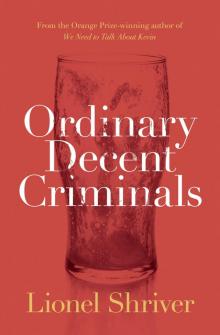 Ordinary Decent Criminals
Ordinary Decent Criminals The Female of the Species
The Female of the Species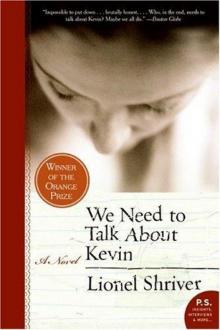 We Need to Talk About Kevin
We Need to Talk About Kevin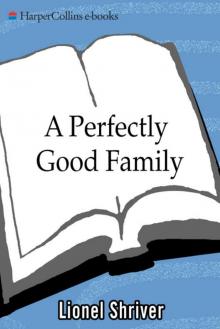 A Perfectly Good Family
A Perfectly Good Family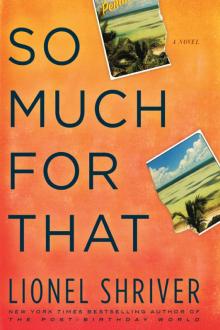 So Much for That
So Much for That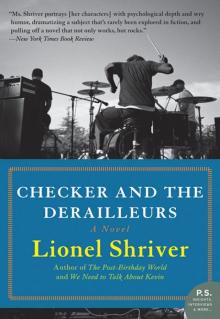 Checker and the Derailleurs
Checker and the Derailleurs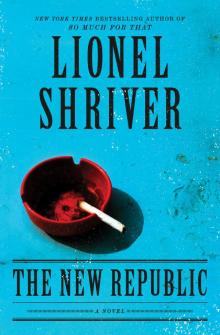 The New Republic
The New Republic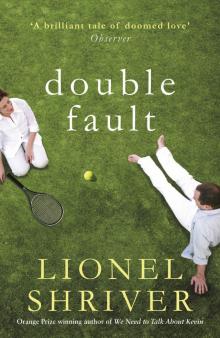 Double Fault
Double Fault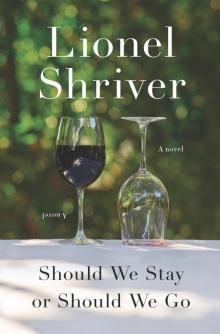 Should We Stay or Should We Go
Should We Stay or Should We Go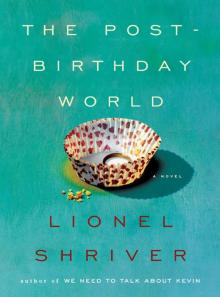 The Post-Birthday World
The Post-Birthday World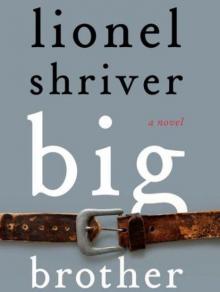 Big Brother
Big Brother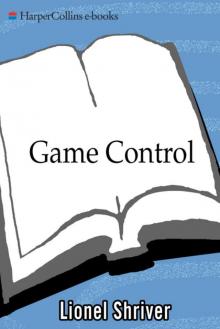 Game Control
Game Control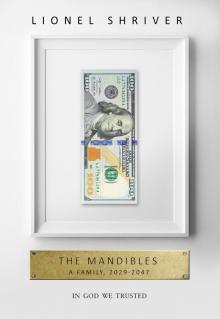 The Mandibles
The Mandibles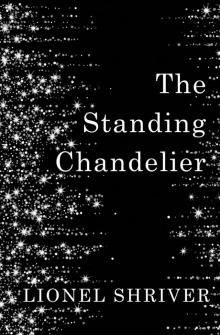 The Standing Chandelier
The Standing Chandelier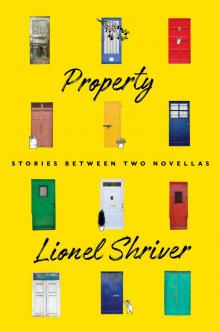 Property
Property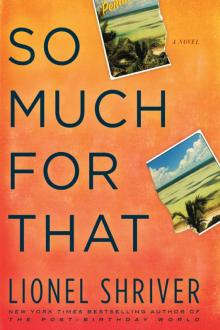 So Much for That: A Novel
So Much for That: A Novel